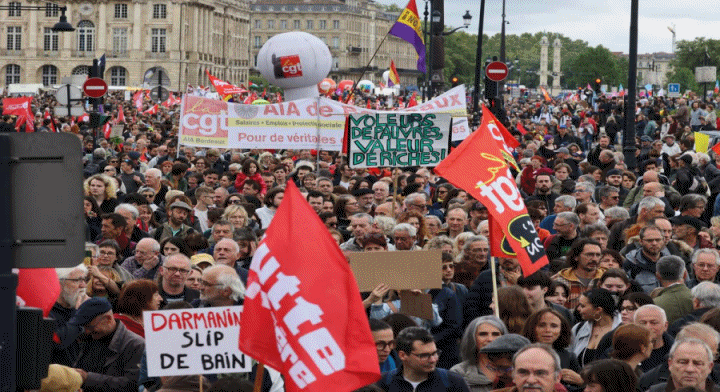MAJOR MOBILIZATION AND VIOLENCE IN THE MAY 1 PROTESTS | |
The police thus counted 16,300 demonstrators in Caen (40,000 according to the CGT), 11,000 in Marseille (130,000), 13,500 in Toulouse (100,000), 15,000 in Brest (33,000), 14,000 in Clermont- Ferrand (25,000), or 2,000 in Charleville-Mézières (4,500). A total of 782,000 people demonstrated across the country, including 112,000 in Paris, the interior ministry said. Last year, 116,500 people marched in France, including 24,000 in Paris, according to the Interior Ministry. Clashes broke out between demonstrators and the police in several cities and 180 people were arrested, including 46 in Paris. the forces of order and stoned windows. Hundreds of "black blocks" in Paris On the other hand, the parades were marked by sometimes violent clashes in several cities in France, and mainly in Paris, Nantes and Lyon. “In many cities in France, May Day was a moment of responsible mobilization and commitment. The scenes of violence on the sidelines of the processions are all the more unacceptable. Support for our law enforcement,” Prime Minister Elisabeth Borne tweeted. 108 police officers and gendarmes injured and 291 arrests in France. "If the vast majority of demonstrators were pacifists of course, in Paris, Lyon and Nantes in particular, the police face extremely violent thugs who came with one objective: to kill cops and attack the property of others”, for his part denounced on the same social network the Minister of the Interior. In Paris, "a police officer was seriously injured, burned following a Molotov cocktail jet", continued Gérald Darmanin, who then reported 108 police officers and gendarmes injured and 291 arrests in France. In the capital, the violence intensified when the pre-cortège arrived at Place de la Nation, the end of the parade. Hundreds of "black blocks" notably used fireworks in direct fire at the police, who responded with a lot of tear gas and defensive grenades. The police headquarters reported in the evening 111 arrests and 25 injured among the police, including 24 taken to hospital. In Nantes, the clashes, which lasted a good part of the afternoon, left five injured, including a gendarme and a demonstrator hit in the hand, according to the prefecture. The authorities have also reported 54 arrests in Lyon, 31 in Besançon or 23 in Bordeaux. " It's a big May Day. It's not a last stand" "We have a historic May Day, I can say that." Even before the departure of the Parisian procession, Laurent Berger welcomed the mobilization everywhere in France for this May 1, marked by the protest against the pension reform. "This great success of the mobilization shows the rejection of the reform and the aspiration of the workers to be considered differently by the government", added the boss of the CFDT. "It's a big May 1st. It's not a last stand, it's the challenge of the world of work to this reform", rejoiced the leader of the CFDT Laurent Berger. "This May 1st is one of the strongest of the social movement", added the general secretary of the CGT, Sophie Binet. The figures were in fact well beyond a classic May Day, even if it was not the "tidal wave" hoped for by the unions. Sophie Binet, new secretary general of the CGT, also underlined that in addition to the rejection of the pension reform, the demonstrators were marching to obtain wage increases and responses to the environmental crisis. "No return to normal" without withdrawal of the reform. This is what the new boss of the CGT, Sophie Binet, has promised. She believes that this new day of demonstrations can serve to show the government that opponents of the reform "will not move on until [the text] is withdrawn". The strength of this mobilization will influence the continuation of the opposition movement to the two-year extension of the retirement age, its form and its timetable. Laurent Berger indicated that the next day, Tuesday May 2, the inter-union will meet to take stock. She will also have to determine the conditions for a possible new meeting with Prime Minister Elisabeth Borne, to whom a united trade union front has so far presented. Laurent Berger said he was ready to discuss whether the Prime Minister invites the unions, adding that the trade unions had an interest in continuing to work as an inter-union It is indeed the first unit parade since 2009. The last unit parade with the eight main unions dates back to 2009, in the face of the financial crisis (the CGT had counted nearly 1.2 million demonstrators, the police 456,000). In 2002 (1.3 million people, according to the Ministry of the Interior), the unions had also united to "block" Jean-Marie Le Pen between the two rounds of the presidential election. The RN gathers in Le Havre. Marine Le Pen's National Rally is expecting around 1,400 of its activists on Monday in Le Havre (Seine-Maritime), a way to relaunch its traditional May Day celebration formerly dedicated to Joan of Arc, now renamed "Fête de la nation" and oriented towards "social peace". The week could be decisive on a subject that has dominated all debates for several months. The Constitutional Council must give its response on Wednesday to the second bill tabled by the Nupes to organize a referendum of shared initiative (RIP) on pensions. The first request had been rejected. "There are two appointments coming up," recalls Laurent Berger. The decision of the Constitutional Council on May 3 and the bill filed on June 8 by the Liot group. He does not believe in a government retreat today. That would be "naive". But "if the Constitutional Council grants the holding of a referendum of shared initiative, then the government will have to put its reform on hold". In the meantime, the challenge for the intersyndicale will be to remain united as differences begin to emerge in the face of invitations from the executive to resume dialogue on other work-related subjects. | |
| Britney Delsey for DayNewsWorld | |
 |
|




